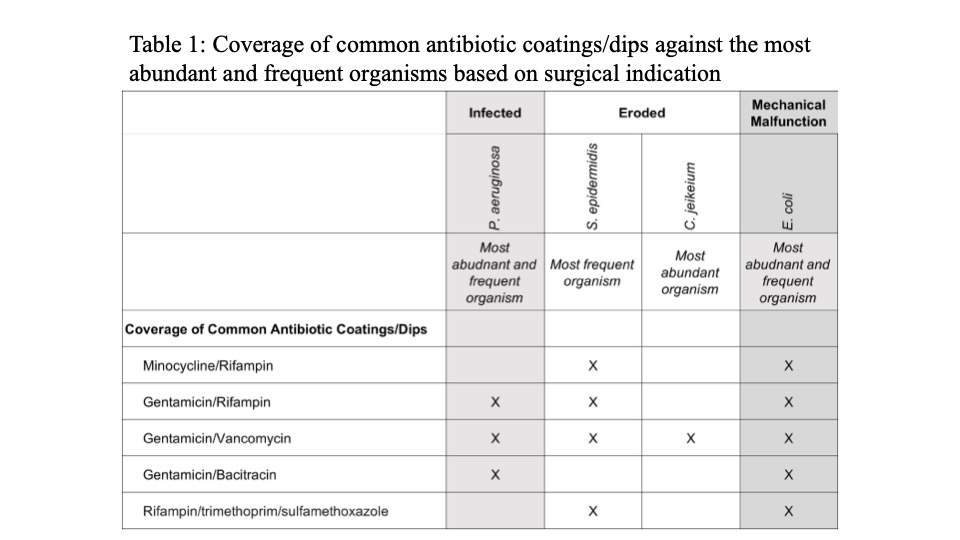Back
Poster, Podium & Video Sessions
Podium
PD52: Sexual Function/Dysfunction: Surgical Therapy II
PD52-06: Penile Implant Bacterial Biofilm Profiles Vary by Surgical Indication: An Opportunity to Modify Peri-operative Care?
Monday, May 16, 2022
7:50 AM – 8:00 AM
Location: Room 252
Paul H. Chung, Joon Yau Leong*, Philadelphia, PA, Caleb D. Phillips, Lubbock, TX, Gerard D. Henry, Bossier City, LA
- JL
Joon Yau Leong, MD
Resident
Department of Urology, Thomas Jefferson University
Podium Presenter(s)
Introduction: Next-generation sequencing (NGS) is an emerging technology that may allow for more sensitive and sophisticated microbial testing of the microbiota of penile prostheses (PP). We aim to describe the microorganism profiles of PP explanted for infection, erosion, and mechanical failure using NGS.
Methods: We performed a retrospective review on 83 patients who underwent penile implant removal. At the time of explant, devices were swabbed with sterile gauze and sent for NGS testing (MicroGen Diagnostics, Lubbock, TX, USA). Differences in alpha diversity (i.e., number of species detected, species diversity across samples) and microbiome compositional profiles (Bray-Curtis community dissimilarities) across samples were assessed using ANOVA and PERMANOVA, respectively.
Results: Indication for device removal included mechanical (n=70), erosion (n=5), and infection (n=8). Species richness and microbiome compositional profiles varied by surgical indication, but not by age, race, diabetes status, or implant duration. When considering all studies, 56% (n=48) of NGS and 29% (n=24) of standard cultures resulted positive for presence of microorganisms. Culture only detected the most abundant NGS species in 62.5% (n=5) of infected devices. Species richness and microbiome compositional profiles varied by surgical indication, but not by age, race, diabetes status, or implant duration. Most frequent organisms by surgical indication were P. aeruginosa (infection), S. epidermidis (erosion), and E. coli (mechanical failure). The highest relative abundance organisms were P. aeruginosa (infection), Corynebacterium jeikeium (erosion), and E. coli (mechanical failure). Vancomycin and gentamicin provide the most comprehensive coverage against these organisms. Minocycline and rifampin do not cover the most abundant organisms for infection and erosion (Table 1).
Conclusions: Bacterial composition of implants varied by indication for surgical indication. This information may help to guide optimal peri-operative antibiotic selection. Additional studies will help to further characterize the clinical significance of these findings and establish whether common antibiotic combinations for prophylaxis, irrigation, and implant coatings should be altered.
Source of Funding: None

Methods: We performed a retrospective review on 83 patients who underwent penile implant removal. At the time of explant, devices were swabbed with sterile gauze and sent for NGS testing (MicroGen Diagnostics, Lubbock, TX, USA). Differences in alpha diversity (i.e., number of species detected, species diversity across samples) and microbiome compositional profiles (Bray-Curtis community dissimilarities) across samples were assessed using ANOVA and PERMANOVA, respectively.
Results: Indication for device removal included mechanical (n=70), erosion (n=5), and infection (n=8). Species richness and microbiome compositional profiles varied by surgical indication, but not by age, race, diabetes status, or implant duration. When considering all studies, 56% (n=48) of NGS and 29% (n=24) of standard cultures resulted positive for presence of microorganisms. Culture only detected the most abundant NGS species in 62.5% (n=5) of infected devices. Species richness and microbiome compositional profiles varied by surgical indication, but not by age, race, diabetes status, or implant duration. Most frequent organisms by surgical indication were P. aeruginosa (infection), S. epidermidis (erosion), and E. coli (mechanical failure). The highest relative abundance organisms were P. aeruginosa (infection), Corynebacterium jeikeium (erosion), and E. coli (mechanical failure). Vancomycin and gentamicin provide the most comprehensive coverage against these organisms. Minocycline and rifampin do not cover the most abundant organisms for infection and erosion (Table 1).
Conclusions: Bacterial composition of implants varied by indication for surgical indication. This information may help to guide optimal peri-operative antibiotic selection. Additional studies will help to further characterize the clinical significance of these findings and establish whether common antibiotic combinations for prophylaxis, irrigation, and implant coatings should be altered.
Source of Funding: None


.jpg)
.jpg)